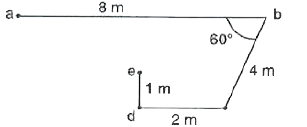A car completes the first half of its journey with a velocity υ1 and the rest half with a velocity υ2. Then the average velocity of the car for the whole journey is : Solution in Kannada
v=√v1v2
v=v1+v22
v=v1v2
2v=1v1+1v2
The correct Answer is:d
As v1 and v2 are the velocities , we have
time taken =distancevelocity
∴ Total time t=s2v1+s2v2
Now avergae velocity v=st
v=ss2[1v1+1v2]
v=21v1+1v2
or 2v=1v1+1v2
Topper's Solved these Questions
- DESCRIPTION OF MOTION IN ONE DIMENSION BOOK - MODERN PUBLICATIONCHAPTER - DESCRIPTION OF MOTION IN ONE DIMENSION EXERCISE - MULTIPLE CHOICE QUESTION (LEVEL-II)
54 Videos
- DESCRIPTION OF MOTION IN ONE DIMENSION BOOK - MODERN PUBLICATIONCHAPTER - DESCRIPTION OF MOTION IN ONE DIMENSION EXERCISE - Recent Competitive Question
12 Videos
- CURRENT ELECTRICITYBOOK - MODERN PUBLICATIONCHAPTER - CURRENT ELECTRICITYEXERCISE - RECENT COMPETITIVE QUESTIONS
32 Videos
- DESCRIPTION OF MOTION IN TWO AND THREE DIMENSIONBOOK - MODERN PUBLICATIONCHAPTER - DESCRIPTION OF MOTION IN TWO AND THREE DIMENSIONEXERCISE - Revision TEST
36 Videos
Similar Questions
A man moves along the path abode as shown in the Fig. What is his displacement from the point of start?

View SolutionA train is moving slowly on a straight track with a constant speed of 2 m s−1 . A passengers in the train starts walking at a stready speed of 2 m s−1 to the back of the train in the opposite direction of the motion of the train. So to an observer standing on the platform directly in front of that passenger, the velocity of the passenger appears to be
View SolutionA battery of emf E has an internal resistance r. A variable resistance R is connected to the terminals of the battery. A current i is drawn from the battery. V is the terminal potential difference. If R alone is gradually reduced to zero, which of the following best describes i and V?
View SolutionThe torque of a force →F=−3ˆi+ˆj+5ˆk acting at a point is →τ. If the position vector of the point vector of the point is 7ˆi+3ˆj+ˆk, then →τ is :
View SolutionA car complete the first half of its journey with speed v_(1), and the rest half with speed v_(2). The average speed of the car in whole journey:
View SolutionWhen a body moves with velocity V1 for first half of the journey and V2 for remaining half of the journey, its average velocity is given by 2Vav=1V1+1V2 . If V1 and V2 are (15±0.5) m/s and (30±0.1) m/s, find the average velocity within error limits.
View Solutionएक कार 200 मी की दूरी तय करती है। यात्रा का पहला आधा भाग वह 40 किमी/घण्टा वेग से तथा दूसरा आधा भाग v वेग से चलती है। यदि औसत वेग 48 किमी/घण्टा है, तो v का मान है
View SolutionIf a car travels at 80 km / h for the first half of its journey and 40 km / h for the rest of the journey, what is the average temperature?
View SolutionA car completes the first half of its journey with a velocity υ1 and the rest half with a velocity υ2. Then the average velocity of the car for the whole journey is :
View SolutionA car covers half of its journey with a speed of 10ms^(-1) and the other half by 20 ms^(-1) . The average speed of car during the total journey is
View SolutionA car completes the first half of its journey with a velocity V1 and the remaining half with a velocity V2. Then the average velocity of the car for the whole journey is
View Solutionएक कार यात्रा का प्रथम आधा भाग v1 वेग से तथा शेष आधा भाग v2 वेग से पूर्ण करती है। सम्पूर्ण यात्रा के लिये कार की औसत चाल है
View SolutionA particle is projected with velocity 'u' at an angle 'θ' with horizontal
Column-IColumn-IIA) Average vertical velocity in complete journeyP) usinθB) Average horizontal velocity in half of the journeyQ) ucosθC) Average velocity in half of journeyR) zeroD) Average velocity in complete journeyS) U√sin2θ4+cos2θT) U√1+3sin2θ4
View SolutionA car travels half the distance with constant velocity of 40 kmph and the remaining half with a constant velocity 60 kmph.The average velocity of the car in kmph is
View SolutionWhen a body moves with velocity V1 for first half of the journey and V2 for remaining half of the journey, its average velocity is given by 2Vav=1V1+1V2 . If V1 and V2 are (15±0.5) m/s and (30±0.1) m/s, find the average velocity within error limits.
View SolutionA car travels half the distance with constant velocity of 40kmph and the remaining half with a constant velocity of "60kmph" .The average velocity of the car in kmph is
View Solution
